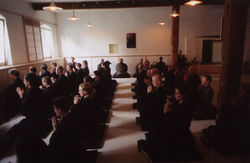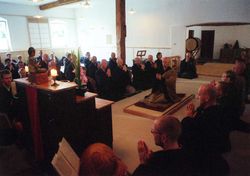Zen-Sesshin/Training Period

A sesshin is a period of intensive Zen-practice. “Sesshin” means both “to become acquainted with ones’ own mind” and “to touch the original, the essential”. This happens unconsciously, naturally in enduring, pervading Zazen, of its own volition, without the necessity of consciously having to search for it.

Individual and cosmos are not two elements opposing each other, but one is the child of the other, and the entity observes itself through the eye of the clarified mind.
When this experience finds a deep reverberation in the body and mind of those practising, it sets the foundation for the implementation of a calm, complete presence in the concrete everyday activities.

These shared activities of practicing, getting up, doing Zazen and Sanpai, eating and working together – for a few days or for a longer period of time – ignites an effect of calm energy, comparable to a fire, in which several logs help to fuel a powerful flame. Inner obstacles, infatuation, anger and greed can melt in it and are transformed into the power of the mind itself.
In the reflection of the original, unsophisticated nature of the mind, the original constitution of life and of all things gleams of their own volition.
Daily Routine/Sesshin Schedule
Getting up at 5:30 a.m. Zazen-practice: 3-4 hours during praparation time of an Ango, about 6-7 hours of per day during Sesshins (partly including verbal teachings during Zazen). Some meals are held in the traditional way in the Dojo.
Some hours of manual labour, for example in the garden, in the park, in the kitchen or the cleaning of rooms (Samu) belong to the daily schedule, too (individuell variations on this schedule are possible, if necessary, requiring prior consultation).
Daily schedule during the training periods
The participation in the training periods requires the membership of the Zen Association Germany.
Apart from Morning- and Evening-Zazen the focus lies on the study of traditional texts and manual labour (Samu).


